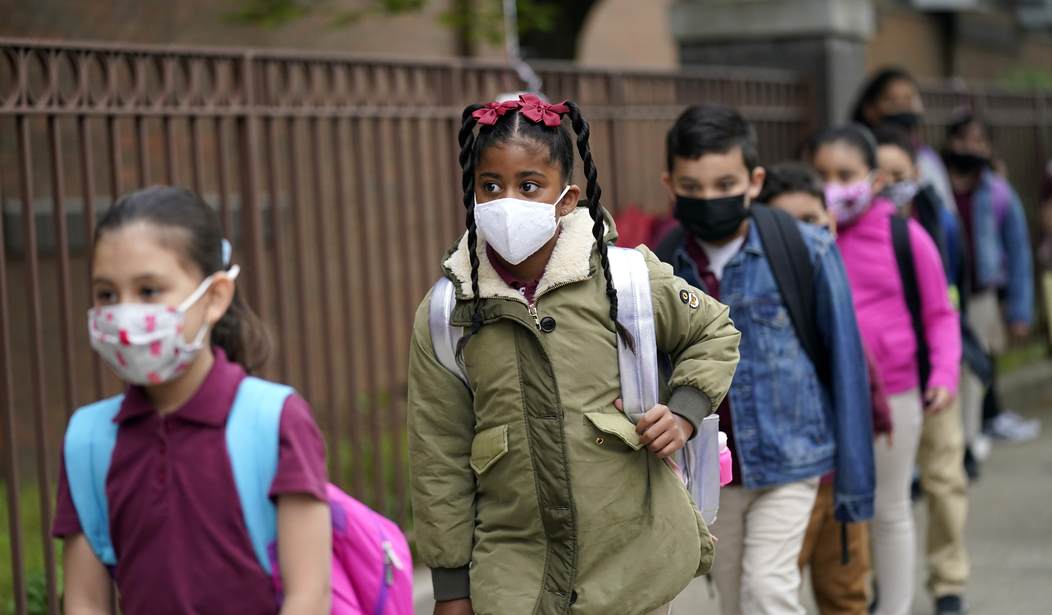Noteworthy, partly because of what it says and partly because of who’s saying it. This comes from the NYT’s David Leonhardt, a writer so influential among smart-set liberals that his daily musings on COVID have appeared more than once to inspire the CDC to change its official guidance on pandemic policy.
Maybe his column this morning will lead Uncle Sam to decide that vaccination should be optional for young children after all. All hail King David the Leon-hearted, giver of laws!
I’m glad he’s highlighting this, in all seriousness. The data from Britain confirms things we’ve known about COVID in broad strokes since practically the beginning. The older you are, the more dangerous it is, and if you’re vaccinated your risk of landing in the ER is much reduced at any age. What we didn’t know is just how small the risk is for children relative to adults.
It turns out that an unvaccinated child is less likely to end up in the hospital than a fully vaccinated fortysomething. Someone who’s fully vaccinated and 70 is at least five times as likely to go to the ER than an unvaccinated kid, and much more likely than that if they’re older.
Covid’s age skew really is remarkable: https://t.co/D7eHsoefxJ
(fin) pic.twitter.com/Ru1Ih4B47t
— David Leonhardt (@DLeonhardt) October 12, 2021
Is that a fluke result from the UK? It’s taken over a short-ish time span, after all. Nope, says Leonhardt, pointing to eight months of similar data from Seattle:
Data from Seattle shows that the risks for unvaccinated children look similar to the risks for vaccinated people in their 50s. pic.twitter.com/e1erxGpxYM
— David Leonhardt (@DLeonhardt) October 12, 2021
Unvaxxed kids between the ages of five and 11 seem about as likely to be hospitalized as fully vaccinated adults from ages 30-49. Note that much of the Seattle data comes from infections recorded before Delta emerged this summer, so to some degree it may reflect a pandemic that no longer exists. Delta is much more contagious than previous strains.
But there’s no hard evidence I know of that Delta is sending infected kids to the hospital at a higher rate. There is some evidence that adults infected by the variant are more likely to need hospital care. So, if anything, the risk gap between kids and adults may have grown over the past few months.
The question and answer we’re missing right now is whether children’s tiny risk of a bad outcome from COVID also means they’re at much reduced risk of transmitting the virus to others. That’s almost the entirety of the case for vaccinating them, after all. We want them to get their shots not because we’re worried about them getting severe COVID but because we fear they’ll pass the virus along to grandma, giving her severe COVID. Emily Oster, an economist who tracks infections in schools, told Leonhardt that she’d get her own kids vaxxed once they’re eligible despite how safe they are from the virus. “I do not want them to get Covid. I am worried about their immune-compromised grandparent. I would like to avoid quarantine and keep them in school,” she said.
Does she have reason to worry about that immune-compromised grandparent, though? Oster’s own publicly available data showed infection rates in schools earlier this year that were so low it could plausibly be argued that kids were safer inside the building, among their peers, than outside of it among adults. Many people have marveled over the past six weeks about COVID’s retreat in hard-hit states like Florida just as schools reopened for the fall, not something we’d expect if transmission were happening in class at any meaningful rate.
How infectious are children, especially young children? Adults can famously pass the virus to others despite being asymptomatic, but is that also true for kids? Or is it only symptomatic kids whom we need to worry about? If so then the case for vaccinating them gets weaker. A sick child can be kept away from vulnerable adults until they’re better. No shot required.
I mean, this is probably true but it’d be nice to have some actual proof:
“Unvaccinated people at any age are much more likely to cause transmission relative to vaccinated people,” as @AaronRichterman says.
If I had young children, I would vaccinate them without hesitation. I have heard the same from multiple scientists.
— David Leonhardt (@DLeonhardt) October 12, 2021
And even if it’s true, with kids so resistant to COVID to begin with, conceivably vaccination will reduce their risk of infecting others by only a negligible amount if that risk is negligible to start with.
The strongest case for vaccinating children, I think, is ironically the case often cited for not vaccinating them — fear of the unknown. Anti-vax parents cite the fact that the vaccines are new and there’s no way yet to measure their long-term effect on children as reasons for not subjecting them to the jab. But SARS-CoV-2 is also new and there’s no way to measure its long-term impact on kids either. Could a bout with COVID affect their growth or cognitive development even if they appear to recover without lasting effects? The question isn’t “Will the vaccine cause health complications?” It’s “Which is more likely to complicate their health, the vaccine or this novel infectious disease?”
I’ll leave you with one last insight from Leonhardt, this time a downer. The vaccines are effective in older people but not as effective as we had initially hoped.
For the vaccinated people over 65, the risks are not zero but low: The annual risk of death for vaccinated people 65+ in Seattle seems to be ~1 in 2,700. The annual risk that an American dies in a vehicle crash is lower — about 1 in 8,500 — but not a different order of magnitude.
— David Leonhardt (@DLeonhardt) October 12, 2021








